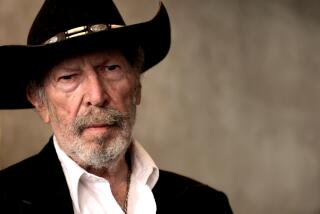Battlin’ Rabbi Takes Record Biz to Task
Is Rabbi Abraham Cooper the Tipper Gore of 1990?
That’s the way it looks to some in the record industry lately. The associate dean of the Simon Wiesenthal Center for Holocaust Studies here has been embroiled in a highly-charged debate over racism in rock music, blasting rap kingpins Public Enemy and rock idols Guns N’ Roses for what he’s labeled racist and anti-Semitic statements and lyrics.
More significantly, he’s also taken the groups’ record companies--and industry promotional events like the American Music Awards--to task for touting bands who espouse what he describes as bigoted attitudes.
“I was offended to see the record industry celebrate a group like Guns N’ Roses--and give them an award-- after the kind of bigoted remarks they made about blacks and homosexuals,” Cooper said. “I can’t imagine why major record companies like Geffen (which distributes Guns N’ Roses) and CBS (which distributes Public Enemy) would be putting these records out. There should be lines you don’t cross.
“I’ve tried to communicate with Geffen executives and gotten nowhere. It’s like Exxon saying ‘no comment’ about the Valdez oil spill. I think they have a social responsibility to at least respond on these things.”
Cooper’s attacks haven’t gone unnoticed. After a two-hour meeting with Cooper Jan. 8, CBS Records chief executive Walter Yetnikoff sent a memo to 7,000 CBS Records employees asking for input in setting company policy, saying “As difficult and subjective as these decisions may be, our company is committed to making sure that none of our recordings promote bigotry.”
Cooper has become such a prickly presence, that he’s mentioned--unflatteringly--in Public Enemy’s new “Welcome to the Terrordome” single, which advises: “(tell) the rab to get off the rag.”
Geffen president Eddie Rosenblatt acknowledged he hasn’t communicated with Cooper. But two days after CBS’s memo became public, he sent a copy to everyone at his company.
“I thought Walter handled the issue perfectly and I wanted to see what our staff thought about it,” Rosenblatt said. “We’ve had many discussions about the memo with both middle and senior management. I have no problem with Rabbi Cooper voicing his opinion, but the issue always becomes: Who has the right to pass judgment on popular music?
“When we were putting out the first Guns N’ Roses album (whose cover was described as a rape fantasy by Tipper Gore in a recent Washington Post Op-Ed piece) we asked many people at the company--men and women--if they had any objections. And they had none. So we feel we’ve looked at these issues with concern and restraint for many years.”
Cooper takes pains to separate himself from crusaders like Gore, founder of the Parents Music Resource Center, who has led a media campaign aimed at persuading record companies to sticker records with potentially offensive lyrics.
“I’m absolutely not trying to act as some kind of morals police,” Cooper said. “You can’t legislate hate out of existence. Warning stickers don’t stop bigotry either. Once you have stickers that say ‘R’ for racism, then you’ve lost. But we have to deal with incidents of bigotry before it becomes a trend, because once it becomes a trend in such a powerful force like pop music, then there’s no way to stop it. When I met with Walter Yetnikoff he said, ‘What do you want from me?’ And I told him, ‘Physician, heal thyself.’ ”
You might say Cooper has been wielding both the carrot and the stick. When Public Enemy’s Chuck D. met Cooper on a visit to Los Angeles, the Rabbi took him on a conscious-raising tour of the Holocaust Museum. “I think Chuck has an open mind on certain levels,” he said. “He may be ignorant of some of our history, but he’s not an anti-Semite.”
But asked about Professor Griff, whose statements (“Jews are responsible for the majority of wickedness” in the world) touched off the initial Public Enemy controversy, Cooper snapped: “He’s a hater. He’s the kind of bigot who never wants to be confused by the facts.”
So far music biz leaders have largely ducked Cooper’s media broadsides, saying privately that they view them as a public relations nightmare. In an industry with a high percentage of Jewish top executives, how can you argue with a Rabbi--and win? Others have complained that Cooper is simply the latest in a long line of self-styled critics eager to attack pop music.
“I don’t think Rabbi Cooper--or any of the other critics out there--are necessarily qualified to judge what lyrics are objectionable or not,” said Joe Smith, president of Capitol-EMI Music Inc. “We’re walking on dangerous ground here. Sure we’ve put out a few records that we haven’t been proud of. But it’s not our intention to make bigoted or racist records. And our artists have a First Amendment right to offer their views, even if they turn out to offend some people.”
And how does Cooper respond to that criticism?
“You don’t have to be a music expert to understand the power of music,” he responds. “Censorship isn’t the issue here--bigotry is the issue. And no one has a right to be disengaged from that battle in 1990.
“I don’t want to be the mashgiach (kosher supervisor) of the music industry. But I do want the corporations who promote this music to take responsibility for their product. If the people in the music industry would roll up their sleeves and challenge racism the way they challenged world hunger and AIDS and political oppression, you’d never hear from me again.”
More to Read
The biggest entertainment stories
Get our big stories about Hollywood, film, television, music, arts, culture and more right in your inbox as soon as they publish.
You may occasionally receive promotional content from the Los Angeles Times.






